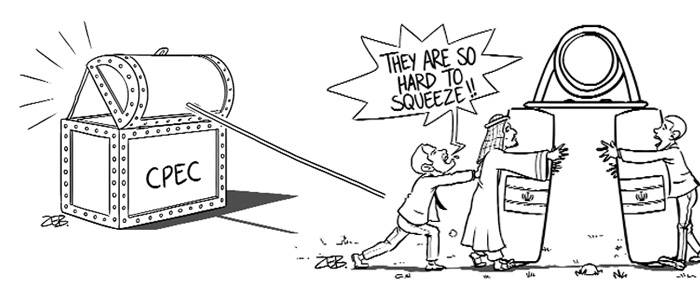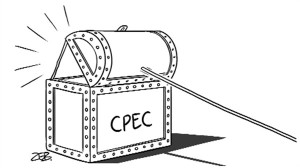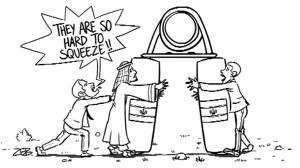
Judicial Commission report
Sir,
Now that the Judicial Commission has produced its long-awaited report on the 2013 election, it is time for Pakistan’s political parties to move on and address the real issues confronting the country. That said, the fact remains that the Election Commission was responsible for numerous administrative irregularities and failed to enforce its writ over those involved in violating the rules. This needs to be rectified through reforms and organizational restructuring.
Prime Minister Nawaz Sharif needs to cut back on his numerous foreign trips and take an interest in good governance by ensuring that his cabinet and bureaucracy start delivering. People voted for the PML-N in 2013 because they were disillusioned with the PPP and hoped that the party would fulfil its electoral promises. This, unfortunately, has not happened.
Universally accepted values for good governance – such as avoiding conflicts of interest and appointing qualified officials known for their integrity to head key state institutions – are essential for achieving results. Moreover, the state must impose uniform direct taxes on every citizen earning above a certain threshold income in order to achieve economic self-sustainability – without which state sovereignty cannot be maintained. Finally, individuals involved in tax evasion and money laundering should be punished exemplarily if we are to restore the rule of law.
A. M. Tariq,
Dubai.
Iranian nuclear deal and Pakistan
Sir,
The news regarding the nuclear deal between Iran and the world’s six most powerful states – with the US as the main signatory – has left Israel discomfited and most other countries largely relieved. Although Pakistan has also praised and supported this key development in the region, the deal does raise some concerns regarding Pakistan’s own geostrategic value.
Some fear that the US may have found a new partner in the region, such that Pakistan may lose its worth in this capacity. As a matter of fact, Pakistan is geographically more attractive to China than to the US, given that the former needs access to the Arabian Sea – for which Pakistan is the most suitable option. Conversely, by the end of the Afghan conflict, the US will no longer be as proactive in the region and its main point of tension with Iran – the proliferation of nuclear weapons – will have been resolved. Meanwhile, the nuclear deal also gives the Iran–Pakistan gas pipeline project space to flourish, with benefits for the Pakistani public in the face of the country’s severe energy shortfall.
As a whole, therefore, Pakistan’s strategic value should remain intact and the deal has direct as well as indirect advantages: it will enable Pakistan to strengthen economic ties with its neighbour while preventing any potential use of force within the region.
Mohammad Mehmood Ahmed,
Lahore.
Death and taxes
Sir,
The business community in the services sector has termed the eight percent un-adjustable withholding tax (WHT) on ‘revenue’ (liable from 1 July 2015) a draconian tax law that will only serve to damage the sector, which currently contributes over 53 percent to the national GDP.
The Bureau of Inspection and Certification’s chief executive, Rashid Mehr, has said that the controversial law puts the sustainability of the services sector at risk in a country where the cost of doing business is already very high. Contrary to this, all other industries have been facilitated by reducing the corporate tax to 32 percent. Mehr argues that the government has ignored the fact that the implementation of this law will likely discourage new business start-ups and future investments in the services sector. On principle the world over, new businesses are not taxed in their infancy.
Services including information technology, certifications and inspections, public relations, advertising, marketing, event management, telecoms and freight forwarding and clearing, all of which facilitate the economy at large, will suffer over the next six to eight months, in turn causing inflation and unemployment to escalate. It is noteworthy that banks, insurance and private transport companies have been exempted from this tax.
As Mehr points out, the taxation rule of thumb is that tax deductions are made on profits only. As per the previous practice, all payments received by any service provider were subject to a deduction of five percent as WHT, which was later increased to six percent and subsequently to a minimum of eight percent. However, all service providers could adjust the withheld tax against their actual tax liability. It is shocking that the new amendment to the law requires all service providers to pay a minimum eight percent as WHT on ‘revenue’.
The services sector already pays 32 percent in corporate tax and was recently made liable to 16 percent and 14 percent GST in Punjab and Sindh, respectively, thus rendering it less competitive. From 1 July 2015, a corporate tax of 32 percent is applicable to all sectors and industries except for the services sector. The services sector accounts for over half of Pakistan’s GDP and creates numerous employment opportunities while making a significant contribution to the national tax reserves. Why then should the government discriminate against the services sector while facilitating the other sectors by reducing the corporate tax from 35 percent to 32 percent?
WHT is not considered a full and final settlement anywhere in the world and is always adjustable against tax liability. To the best of my knowledge, the maximum rate of WHT around the world is no more than five percent. Under the new tax law, a minimum of eight percent tax on revenues will be withheld regardless of whether the services company is profitable or loss-making.
As the average net profitability is six to eight percent after tax for most businesses, the increased rate of eight percent WHT (even if adjusted against tax liability) will lead companies into a liquidity crisis and leave them unable to pay their debts on time. Moreover, imposing a minimum eight percent WHT on revenues ignores the profitability of small and medium companies.
The government has also ignored another very important aspect in levying this tax, i.e., the difference between a company with low profit margins and high revenues and one with high profit margins but low revenues. As such, this tax law does not equalize different types and scales of business. It will force people to put their money in banks and earn interest; this amalgamates hoarding with inflation and will have an adverse effect on the economy. Such a tax regime will produce property dealers and shopkeepers, not entrepreneurs.
Finally, the amendment may also give way to the financial malpractice of undervaluing revenue just to save something that belongs rightfully to business owners. If this law is not undone, many companies may find they are forced to close down operations.
Khola Nasir,
Lahore.
‘Do-or-die’ CPEC

Sir,
Pakistan’s political and military leadership is absolutely clear about the importance of the China–Pakistan Energy Corridor (CPEC) for the development of the country as well as the region. When the Chief of Army Staff, General Raheel Sharif, visited Balochistan on 25 July to inaugurate the road network being built by the Frontier Works Organization, he reiterated that the strategic port of Gwadar and the CPEC projects would be completed at all costs.
No doubt, such infrastructure development provides a sound basis for Pakistan’s road to economic prosperity. During the Chinese President’s visit to Pakistan in April earlier this year, a total of 51 memorandums of understanding worth $46 billion were signed under the CPEC master project, which comprises a network of highways, railways and power generation projects.
At a strategic level, the CPEC will yield great dividends for China, including direct access to the Arabian Sea, the Gulf states and – on the Xinjiang province side – the Central Asian states. The $46 billion lending for the project will also bring attractive business to the Chinese banking sector. Last but not least, with rights to Gwadar Port for the next 40 years, China will make a strategic addition to its ‘String of Pearls’ in the Indian Ocean, thereby reducing American influence in the region.
For Pakistan, the CPEC represents a game-changer in that Gwadar will be developed into a large seaport capable of attracting huge investment; its airport will also be upgraded to international standards. The western route originating from the port will pass through the Baloch belt and is liable to bring key business opportunities and economic prosperity for local residents. Similarly, the central route will also pass through the southern Baloch belt and rural Sindh, connecting these areas with the National Highway at Ratodero. The railway and road infrastructure from Karachi to Peshawar will also be upgraded. Further north, with local participation, the entire Gilgit-Baltistan (GB) stretch stands to gain economically and socially.
More importantly, perhaps, two thirds of the total CPEC package (approximately $34 billion) will be invested in generating the energy resources that Pakistan desperately needs to reduce the number of power outages and restart its industry sector – parts of which are lying idle for want of power. Inbuilt into the project is the actualisation of the Iran–Pakistan gas pipeline, which had been stalled due to lack of funding and US pressure. All in all, the CPEC stands to generate immense economic activity in all the provinces, including GB, thereby contributing towards national economic growth and prosperity.
Of course, none of this is as simple as it sounds. A number of local, regional and international actors are opposed to the very idea and are likely to attempt manoeuvres to sabotage the execution of the project. Although the Pakistan government has been able to achieve political consensus on the route, sequence and priorities of the infrastructure development envisaged under the CPEC, there are non-state actors with divergent views that may well seek to disrupt progress.
In Balochistan, it might be the BLA, Jundullah, Lashkar-e-Jhangvi or TTP. In KP, it could be the remnants of the TTP and nationalist parties. In Sindh, there are nationalist parties seeking to create problems in case of differences with the central government. In southern Punjab, there is the lingering threat of the Punjabi Taliban. In GB, the TTP might instigate sectarian clashes to derail the project.
A series of terrorist acts in China’s Xinjiang province – reportedly by the TTP – may also have serious repercussions for the project. India, meanwhile, has openly expressed its reservations and opposed the idea on the grounds that part of the proposed route passes through the disputed territory of Jammu and Kashmir. Allegedly, the Indian intelligence agency RAW is already active in Balochistan, supporting anti-state elements and creating security situations in areas such as Mastung and Hazara in attempts to dispel foreign investment.
Additionally, India opposes the development of the Gwadar port because it has invested heavily in the adjoining Chabahar port, which gives it easy access to Afghanistan without having to pass through Pakistan. India is aware of the CPEC route’s strategic importance for China vis-à-vis the option of routing its supplies through the Indian Ocean or Malacca Straits. The US, which has a similar agenda, is not happy about China’s access to Gwadar and has tried to put pressure on successive Pakistani governments to hand over control of the port to the Singapore Port Authorities. Equally, America has opposed the Iran–Pakistan gas pipeline. Thus, there are a range of threats to the project overall.
Both the governments of China and Pakistan are aware of this multidimensional opposition to the CPEC. The project’s starting point – the Gwadar belt – and its end point – the Gilgit-Khunjerab area – are both vulnerable. There is an urgent need to mobilize all available resources to create an environment that is conducive to implementing the project. To this end, security is key to the overall success of the CPEC.
Pakistan has raised and equipped a dedicated force to provide security and protection to the Chinese engineers and workforce involved. Operation Zarb-e-Azb has successfully minimized the threat of the TTP in KP and the military leadership has hinted at extending the operation to Balochistan in order to establish the writ of the government in the troubled province.
It is also time for the Government of Pakistan to take the bold decision to delink GB from the Kashmir issue and formally declare it the country’s fifth province. Simultaneously, Pakistan should gear up its diplomatic efforts to convince the US of the CPEC’s importance to the country’s development. Beside equipping and training the law enforcement agencies (LEAs), the local leadership and civil administration must be made responsible for protecting both the CPEC workforce and the proposed infrastructure as part of the National Action Plan. Both the intelligence agencies and LEAs will have to remain vigilant and extend the perimeter of security to remove all hurdles in the project’s way.
M. Latif,
Islamabad.
One big happy nuclear family

Sir,
The nuclear deal concluded between Iran and the P5+1 in July in Vienna has generated mixed reactions both in the US and among its allies in the Middle East. The agreement envisages that Iran will shed its enriched uranium resources and two thirds of its centrifuges, and allow IAEA inspectors access to the country’s nuclear energy facilities. In return, the unilateral sanctions imposed by the US will be gradually eased, giving Iran access to assets that have been frozen since the Revolution of 1979. The deal will become effective only after it is ratified by the US Congress and the Iranian Supreme Leader. While Europe, Russia and China appear to be satisfied with the carefully negotiated deal, US lawmakers remain divided.
Israeli Prime Minister Benjamin Netanyahu is the staunchest opponent of the deal, which he has termed a ‘historic mistake’. He is pursuing the strong Jewish lobby in the US to oppose the bill in Congress and force the Obama administration to back down from the agreement. Netanyahu argues that the deal should have been linked to a ‘change’ in behaviour on the part of Iran. Israel perceives that lifting the sanctions will give Iran the requisite space and funding to increase its influence in the region, implying that the latter will arm and fund Hezbollah with the intention of targeting civilian installations and Jewish settlements in Israel. The Israeli state’s biggest concern is that the deal will give Iran a free hand to pursue its nuclear program and acquire nuclear weapons detrimental to the security of Israel, although President Obama has assured Israel that the deal has effectively closed all doors to the development of nuclear weapons for Iran.
Meanwhile, the US allies in the Middle East are perturbed at the idea of concluding a nuclear deal with Iran. While concerned at the prospect of a nuclear-armed Iran, they are equally apprehensive about a sanction-free Iran with enhanced conventional capability and enough fiscal space to support the region’s Shia population. Saudi Arabia fears encirclement by the Iranian-supported regimes in Syria, Lebanon, Iraq, Bahrain and Yemen.
The Iranians, however, are already celebrating the nuclear deal, which, for them, represents a win-win situation. Once declared by the US to be a rogue state and part of the ‘axis of evil’, the deal is clearly a diplomatic success for Iran. Its conservative society is desperately looking forward to opening up to the world under the relatively liberal government of President Hassan Rouhani. The agreement will allow Iranian banks to deal with the international banking system. Iran will also gain access to previously frozen assets and the much-needed fiscal space to invest in its oil industry. The deal will also allow foreign direct investment and the export of oil and gas to Europe at competitive costs. Once UN sanctions are lifted, Iran will also be able to enhance its conventional military capability.
Russia is content because it has been supporting Iran at international forums and, in the absence of international sanctions, will be able to sell Iran conventional military hardware – in return purchasing 90 percent of its enriched uranium and extra nuclear centrifuges. As part of the P5, China must have pondered on the pros and cons of the deal and ensured its own interests were safe before giving any go-ahead. China will now be able to import much-needed oil and gas through Pakistan, although the development of Chabahar Port as a competitor to Gwadar may prove an undesired knot in the so-called Chinese ‘String of Pearls’ stratagem.
India should be pleased with the deal: despite the sanctions, the country has invested heavily in the development of Chabahar Port, which gives it overland access to Afghanistan and Central Asia. India’s presence in Afghanistan and the south of Iran creates a dilemma for Pakistan, however, given the potential for a sea blockade in case of armed conflict between the two nuclear rivals.
Pakistan itself has welcomed the nuclear deal with Iran. The removal of sanctions against Iran will allow Pakistan to import oil, gas and electricity from its neighbour. The long-awaited Iran–Pakistan gas pipeline is expected to become functional within six months. However, with multiple options available to Iran for exporting its energy resources, Pakistan may find itself having to renegotiate the price tag. Moreover, Pakistan will to have to maintain a fine balance in articulating its relationship with Iran and Saudi Arabia. Pakistan should make it clear to both countries that it will not allow them to make it a proxy battleground for promoting their respective schools of thought. Let us wait and watch as to how the nuclear deal with Iran unfolds and affects the regional security calculus.
Muhammad Latif,
Lahore.

